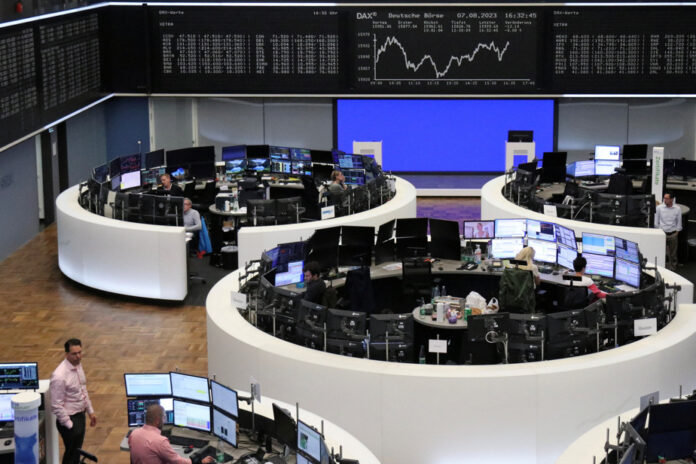(Paris) European stock markets fell sharply on Tuesday, as did interest rates on the bond market, investors worrying about disappointing Chinese economic data and the health of the banking sector.
Wall Street was heading for a lower open as the global macro picture “suddenly darkened” after a string of bad news, according to Oanda analyst Edward Moya. Futures for the three major indices were dropping between 0.62% and 0.85% around 7:30 a.m. EST.
In Europe, Paris experienced a sharp drop of 1.29%, Frankfurt of 1.47% and London of 0.82%.
Milan fell 2.60%, dragged down by its banking sector after the Italian government decided to levy a 40% tax on banks’ “billion-euro surplus profits” to offset the cost to households and businesses. of soaring interest rates.
In addition, ratings agency Moody’s downgraded the ratings of ten small US banks, but also signaled that it was likely to downgrade the ratings of larger institutions such as US bank BNY Mellon or U.S. Bancorp, Bloomberg reported.
The banking sector thus spent the first half of the session in the red and continued to sink into negative ground around 8:05 a.m. Italian banks recorded the largest declines: Montei dei Paschi dropped 10.32%, BPER 10.20 %, Intesa 8.40%, Banco BPM 8.59% and Unicredit 7.18%.
In Frankfurt, Commerzbank lost 4.87%. In Paris, BNP Paribas dropped 4.28% and Crédit Agricole 3.80%, the two French banks being well established in Italy.
Reduced trading volumes, characteristic of the month of August, also tend to exacerbate variations.
On the European bond market, rates eased significantly, a sign that investors are turning away from risky assets, such as equities, in favor of bonds, considered safer, like the dollar.
The yield on the 10-year German government bond stood at 2.45% against 2.59% at the close the previous day. French at the same maturity was at 2.97% against 3.13%. In the United States, the ten-year rate was 3.99% compared to 4.09%.
On the foreign exchange market, the dollar rose by 0.55% to 1.0944 dollars for one euro.
Chinese stock markets also fell earlier: Hong Kong fell 1.81% and Shanghai 0.25%, due to the country’s poor export figures.
The latter unscrewed in July (-17.2%) to experience their strongest decline since January-February 2020, when Chinese economic activity had been practically brought to a halt by the beginnings of the COVID-19 pandemic.
If the analysts polled by the Bloomberg agency expected a decline (-13.2%), they were however surprised by its magnitude.
Investment firm Abrdn slumped 9% in London after publishing its half-year results showing lower operating profit and lower capital under management.
The German chemicals group posted a net loss of nearly 1.9 billion euros in the second quarter, due to falling sales and prices of glyphosate-based herbicides, according to detailed results published on Tuesday. Its stock price fell by 1.89% in Frankfurt.
Crude prices fell sharply around 8 a.m. ET, weighed down by investor risk aversion and worries about Chinese demand after the release of disappointing trade data in the country.
A barrel of Brent from the North Sea, for delivery in October, lost 2% to 83.64 dollars.
Its American equivalent, a barrel of West Texas Intermediate (WTI), for delivery in September, dropped 2.06% to 80.25 dollars.
Bitcoin was up 0.81% at $29,394.















